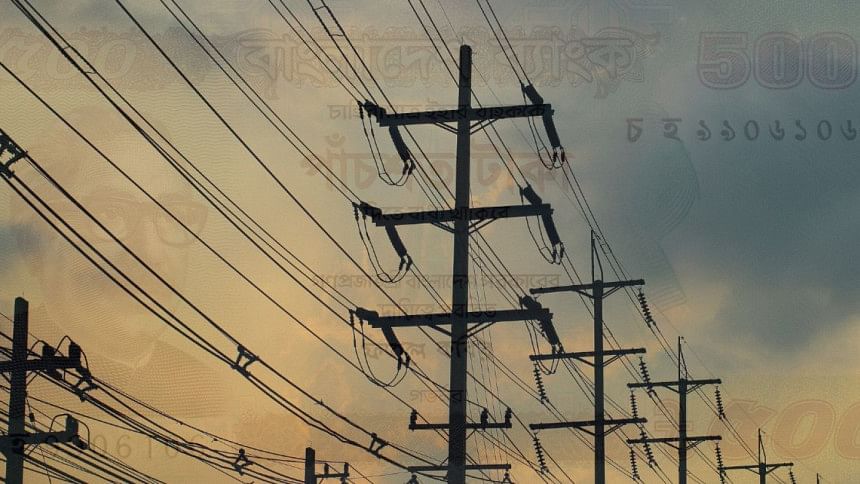When public servants get punished for doing their job

After an official report exposing major weaknesses in the power sector drew much attention, the government suspended former director general of the Implementation Monitoring and Evaluation Division (IMED) SM Hamidul Haque, who was an adviser to the report, and former IMED director Mohammad Mahidur Rahman last month for "misconduct." Hamidul and Mahidur were made officers on special duty through separate orders on July 16 and 17, respectively. The following day, Mahidur was suspended, and Hamidul was suspended two days later on July 20.
The decision came at lightning speed. Authorities formed a three-member probe body, and within a week, made the two OSDs before suspending them. The officials did not get an opportunity to defend themselves, which is a clear violation of labour rights.
The report, uploaded on the IMED website on May 25, called the practice of paying capacity charges to power plants a "model of robbery." After the "Research Report on Implementation Progress of Projects in Power Sector" was widely covered by the media, the Planning Division quietly revised it, altogether deleting the section critical of the power sector's business model.
Firstly, the Planning Division should not be a political office; rather, it should objectively analyse and assess the country's resources and development prospects, being free from any political narratives. It is through such analysis that the government can make informed decisions and formulate policies that best serve the interests of the nation and its people.
Punishing two officials for fulfilling their duty is deeply concerning. The report provided an accurate picture of the energy and electricity sector, which apparently goes against the views of the current regime. It is indicative of a lack of freedom in intellectual work within bureaucracy and raises questions about the environment in which public servants presently operate. Far from such actions, there should be a mechanism to safeguard the rights and responsibilities of public servants, allowing them the freedom and authority to work without fear of reprisal or punishment.
The original research findings stated that the power sector is draining Bangladesh's foreign currency reserves because it has been developed on a "model of looting." The report claimed that the financial crisis the sector faces will not go away unless inappropriate incentives to private power investors – such as capacity charges, tax-free imports, high power prices, easy bank loans, and cheap fuel supply – are cancelled. Furthermore, some corrupt managers, who lack experience and technical knowledge, have turned Bangladesh's power sector into a "rehabilitation centre" for ineligible suppliers, mainly from China and India, via wrong and unwise power purchase agreements or contracts. Expanding Bangladesh's power generation capacity without securing primary energy is another flaw. Some of these insights are not new at all and have already been published in national dailies.
The researchers' original report stated that the current model of capacity charges is not sustainable. Only two conditions are enough to attract investors: offering the facility of mandating the sale of electricity at a higher price of 25 to 50 percent, depending on the location; and the government guaranteeing uninterrupted purchase of one-fourth or half of the electricity, together with provision of bank loans on easy terms. Instead of capacity charges, overhauling charges should be the standard capacity payment method in the power sector, a charge for the time the power plant cannot be in production for maintenance (up to 20 percent) so that the investment is protected. But paying capacity charges to power plants which are unable to produce anything for months is truly a "budget and dollar reserve draining malpractice."
Payment in dollars is a major problem, according to the initial report. Private power plants are domestic, so it is unreasonable to pay them in dollars. In this case, the report recommended paying private plants in Indian rupees. Apart from this, IMED researchers initially commented that the funding crisis of the power sector cannot be resolved unless the "budget draining" payment process is stopped.
Highlighting the sector's inefficiency, the report said that the energy efficiency of dozens of power plants is less than 30 percent. That is, they are producing very little electricity by burning too much fuel. Another problem is that thousands of captive power plants (expired and extremely energy-inefficient plants imported from abroad under false declarations and forged certificates of origin) are now a big burden on the sector. As loadshedding increases in the country and more captive power plants run, more energy will go to waste.
The IMED report also identified the lack of coordination between power generation and transmission. Rampal and Payra power stations have been constructed in remote locations where installing transmission lines is very expensive. The Matarbari deep sea port will not be useful anytime soon. Rooppur is also far from the load centres. As a result, a lot of investment will go into transmission lines.
In the absence of proper planning, the return on huge investments in the power sector will remain negligible. It is necessary to implement a smart, future-oriented, and transparent plan.
A clear example of such weaknesses is the Rampal power plant. It shut down seven times in seven months. The centre was closed for almost half of July due to mechanical problems. There is also a coal crisis due to the dollar shortage. As such, none of the allegations of improper planning of primary fuel and of sub-standard equipment use are false. Due to these reasons, long-term uncertainty has arisen in the power sector, which the government cannot deny. So, the question arises: why have the officials been punished for a factual report?
When a research-based article is published without any counter from the respective resource domain of the state, that article becomes public property. If there were any opposing arguments or differing viewpoints from the Bangladesh Power Development Board, a constructive dialogue would have been possible. Penalising the officials in this manner sets a worrying precedent for intellectual freedom and expression.
Safeguarding the integrity and independence of public servants is essential. The two fired officers' work, which was in line with their professional duties, should be restored as it is crucial to uphold the principles of freedom and protect workplace rights.
Faiz Ahmad Taiyeb is a Bangladeshi columnist and writer living in the Netherlands.

 For all latest news, follow The Daily Star's Google News channel.
For all latest news, follow The Daily Star's Google News channel. 








Comments